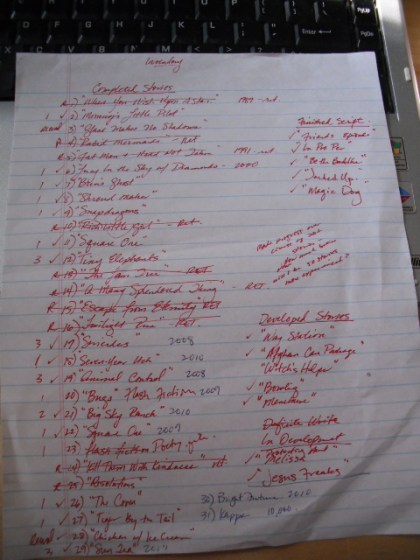So I received my first rejection of the year yesterday for a little science fiction piece I wrote. I sent it to a brand-new market that only specifies they want science fiction, and since there are no previous issues to judge the editor’s taste, I took a chance.
(I should note, the minute I received the rejection notice, I subbed it out immediately to another market I had already scoped out. So here’s hoping.)
This isn’t the first time I’ve submitted work for publication consideration. I have a handful of rejection letters, some form, some personal…the personal ones always encouraging. (I think editors, as a group, tend to be an encouraging bunch.)
But looking back at my submission history, it’s apparent that I’ve made some very poor decisions in the past. I’ve submitted stories that were completely wrong for a particular market, like a ghost story to a magazine that specializes in heroic fantasy. Embarrassing.
Now that I’m getting serious about publication and getting my work out there, I’m spending more time studying my markets, figuring out the best way to get in the door. Before, I had a tendency to take my current best work and send it out in the hopes that someone — anyone — would like it and buy it. Now I’m approaching the whole submission process as an exercise in matchmaking.
Lots of us have tried to set up our friends. Some of us are good at it, helping to bring together people who have married and had children. Others of us — you know who you are — have set up friends solely on the basis that they’re both single and breathing. That’s putting a lot of stock into “luck of the draw,” for to be a successful matchmaker involves much more than luck.
There are professional matchmakers out there who make a very healthy living bringing people together. I think as writers seeking markets for our work, we can benefit greatly by learning and mimicking the successful matchmaker’s process.
1. First of all, a successful matchmaker determines what the goals are for both parties seeking a partnership.
Obviously, a Jewish man seeking a Jewish wife is not going to be a good match for a Christian woman seeking a Christian husband. Easy stuff.
For writers, this translates into knowing how to best identify the type of genre or flavor a particular story is — let’s say high fantasy — and sending it to a market that favors high fantasy and not, let’s say, horror or romance.
2. A successful matchmaker spends a lot of time with her clients asking them lots of questions about their likes and dislikes, habits, hopes and dreams, political leanings, et cetera.
Same for writers. You already know your story. But do you really know your market? Have you read any stories from your target market? How many have you read? Are all these stories published under the same editor, or has the editor changed?
In studying a market, not only are you trying to discern the tastes of an editor, but you are also trying to discern the taste of the audience that particular editor is selecting stories for.
3. A successful matchmaker has lots of clients. The bigger the pool of fish, the more possibilities for finding the perfect someone.
Don’t forget to broaden your pool of potential clients. In other words, if you’re not an avid reader of short fiction and you’re trying to publish short fiction, you better get avid. The more markets you read and enjoy, the more potential clients you’re getting to know better.
At the same time, you’ve got to constantly increase your body of work. Continue to write new stories. Not only does that reduce the emotional investment you have in one particular story, but the more stories you write, the better the odds are that you’ll have something that will suit a particular editor and market just perfectly.
4. Sometimes you’ve got to take a stab in the dark to find out what you’re poking.
All that being said, sometimes — like in the case of a brand-new market — you just have to suck it up and go on a blind date. Sometimes blind dates go well, and sometimes they’re disastrous. The good thing is, as long as you submit work in a professional manner, the worst that can happen is it’s simply not selected for publication.
Unfortunately, for a romantic hopeful on a blind date, disastrous means they could end up standing in a parking lot waiting awkwardly for their date to finish peeing by his car. (This has happened to people I know — and no, it wasn’t me.)
5. Keep trying.
Keep at it and connections will happen. Stories will find homes with loving editors and adoring audiences. Kiss enough toads and one day you’ll find that tall dark handsome stranger who makes your knees weak and doesn’t live with his mom.
For all good things in life, there is risk. Don’t be afraid to fail. It just means you’re one step closer to success. Start reading with a passion. Find out where all the cool people hang out. Then dress up your babies and send them out there. Eventually one of them will come home with a ring on its finger.
Good luck, everyone!














